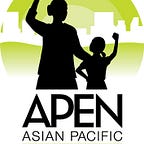Everything Everywhere All at Once Offers a Way Forward through Climate Despair
I watched Everything Everywhere all at Once on its opening weekend at the insistence of friends who were trying to get me through a bout of hopelessness.
The Intergovernmental Panel on Climate Change (IPCC) special report on impending climate catastrophes had been released, and geopolitical narratives were being pushed by politicians feeding Anti-Asian violence that stood in the way of global worker and climate action. And of course, on top of all of this, my personal life was falling apart.
Exasperated and lost without a coherent strategy for change, I wondered — was caring or thinking deeply about any of this going to make a difference?
Turns out I wasn’t alone in feeling that sense of despair.
This nihilism is verbalized by Jobu Tupaki, the leading villain in Everything Everywhere All at Once, “Nothing really matters. Feels nice doesn’t it, if nothing matters, then all the pain and guilt of making nothing of your life goes away.”
Young people around the globe are feeling a sense of fatalism and nihilism as we lived through a global pandemic where governments failed our communities and the wealthy have just gotten wealthier. With the anxiety and fear that young folks are experiencing of the world ending as we know it, it’s not surprising that we feel more stress than ever about the fate of the planet and ourselves.
We’re told that the only path forward is to vote for the lesser of the evils or to stop using plastic straws. For those of us that enter into political work, we’re told that in order to have a seat at decision-making tables, we must accept the inevitable, and try to curb the worst of the harms. That we must work within the existing systems of extraction, exploitation, and endless growth, instead of trying to transform them or build new systems.
But we’re misdirected from seeing another way through this chaos.
When Jobu presents the “everything bagel”, a void created for self destruction, Evelyn, the frazzled immigrant mother played by Michelle Yeoh, almost gives up on herself, telling herself that it’s too late to imagine an alternative relationship with her daughter, Joy (who transforms into Jobu).
In choosing climate fatalism, we are stripping ourselves of agency and power to find new ways forward.
In Everything Everywhere All At Once, Waymond, Evelyn’s husband, offers another way. He finds joy and humor in everything — taping googly eyes to a customer’s laundry bag, a baseball bat, washing machines.
Waymond proposes that there’s another way through life’s chaos: kindness and empathy. He says, “when I choose to see the good side of things, I’m not being naive. It is strategic and necessary. It’s how I’ve learned to survive through everything.”
Waymond’s approach isn’t unanchored optimism. It’s a strategy for thriving. In the face of struggle and despair, it grants us the power to shape our daily lives, to transform mundane tasks into opportunities for joy and connection.
In the end, Evelyn chooses Waymond’s hopefulness. She picks up his baseball bat, picks up the googly eye and sticks it on her own forehead. She holds on to her daughter Joy, pulling her back from the void of despair.
As we face a looming recession and worsening climate disasters, we cannot give in to fatalism, or give up on ourselves and the people we love. We must choose hope.
At APEN, it’s through moments like eating dim sum with our elder Oakland leaders, and giggling through Tiktok videos with our Richmond youth leaders, that remind me how important it is that we build our purpose, strategy, and meaning with our members through joy.
Over the years, our communities have come together to fight for rent control measures that keep families in their homes, pollution controls at refineries that clean the air we breathe, and funding for our schools, parks, libraries and public services.
Whether we win or lose, each fight builds our power through relationships and connections with one another.
In times of despair, we can stick on that third googly eye, and remind ourselves, that yes, everything and everyone we love matters.
Maggie Tsai is APEN’s State Political Director. In her free time, Maggie loves to be by the ocean, watch movies like Everything Everywhere all at Once, and host dinner parties with her friends and family.
